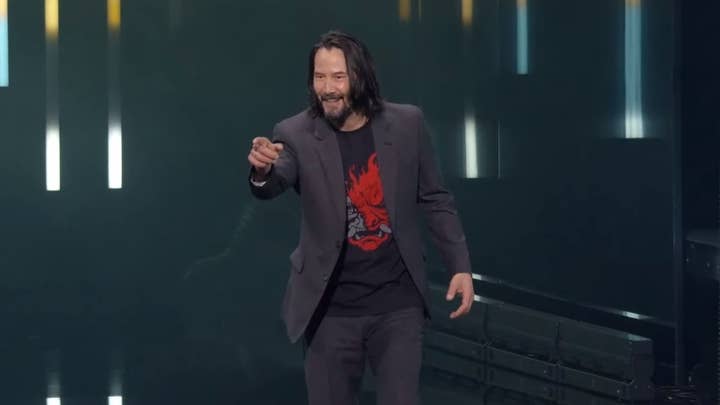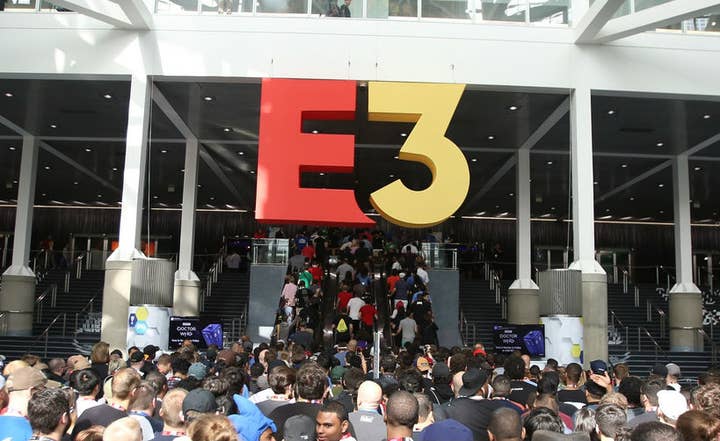Don't let ego kill E3 | Opinion
E3 is a silly, special week in the games industry calendar -- and maybe it doesn't need to change that much to survive
There is an illusion that E3 is supposed to offer some sort of return-on-investment. As if spending millions and millions on outrageous booths, celebrity appearances and expensive stadium shows will somehow result in huge game sales.
But that's not how it works. E3 is all about ego. It's ego that convinced Bethesda to paint a giant Doom Eternal mural on the side of Hotel Figueroa. It's ego that made Capcom think it was worth building the most extravagant statue to promote some Monster Hunter DLC. Keanu Reeves, The Forza LEGO car, the Fornite party... ego, ego, ego.
It has always been this way. Ego is what E3 is built on. Big companies trying to look bigger than the other big companies.
"Ego is what E3 is built on. Big companies trying to look bigger than the other big companies"
Ego might also prove to be E3's undoing. EA left E3 under the pretence that it wanted to do something for the public. E3 subsequently allowed more consumers into the show and EA continued to not show up. Instead, it spent even more money taking over huge locations to promote its products to gamers and media alike. This year, it took over the open air Hollywood Palladium and asked its audience to queue for hours in the baking California heat. It did seem to work, because fans in their delirium were seen scrawling "Fuck Fortnite" on the perimeter wall, seemingly forgetting that they stopped playing Apex Legends months ago.
EA Play is ego. Microsoft's decision to have its own building -- despite the fact that it was soulless and a real pain to get in and out of -- is ego. Even Sony's decision to not come is ego. Sure, it might have been left out of the conversation about the future direction of the games business, but what better way to 'win' E3 than not to go and have everyone miss you? Even if, bar a brief spell on Monday, nobody really noticed in the end.
The only company that can't get this ego thing right is Nintendo. It had a series of announcements that were begging for a big reveal onstage. The Banjo-Kazooie Smash Bros announcement was greeted in the New York Nintendo Store with such scenes that you'd have thought the franchise was still actually a thing. And if there's one reveal that would send gamers into a frenzy more than Keanu Reeves, it's a teaser for a new Zelda game. But Nintendo didn't do a stage show -- because, you know, Nintendo.
Of course, with Sony absent, there was a need for different egos to plug the gap. Fortunately, the E3 Coliseum stepped up. Jack Black was there. Clearly bored of being both a movie star and a rock star, he's decided to have a crack at being a YouTube star by hosting his son's gaming YouTube channel.
"By all means bring out a Keanu Reeves and build a haunted house booth, but only when it makes sense"
But the real showdown was when Todd Howard and Elon Musk rocked up to discuss putting games into Tesla cars. The practice of playing games in cars clearly concerned some people on social media, but that's because they're under the illusion that someone is actually going to do that. The whole thing smacks of a billionaire who wants to get into video games, and a millionaire who wants a new Tesla.
I may sound mocking, but the one-upmanship of the games industry during E3 week is exciting. E3 is like the best reality TV show, where game execs try to outshine one another, and journalists scuttle around trying to trip them up by getting them to say something controversial. Maybe we should introduce elimination rounds after each day to spice things up.

E3 attracts the media and the world's attention, and that's good. But irrespective of that goodness, there is still a drive to justify the expense. The obvious solution is to turn E3 into a full-blown consumer show. The 'Gamescom model' is a term thrown around by people, but nobody really wants that -- not deep down. Strauss Zelnick doesn't want to be accosted in the toilet by fans thanking him for the games he didn't make (true story). The E3 security queue is irritating enough as it is.
And consumers don't want it, either. They might think they do, but they don't. The act of queuing up for three hours to watch a game developer walk through a demo is not a great consumer experience. If E3 wants to become a consumer show it needs to effectively become a different event entirely. And what's the point?
So instead, how about this ridiculous idea: how about E3 doesn't change? That the business still spends big on the show, but not that big. The press conferences move closer together, and maybe take place in the same area. And if you do only have some DLC to promote for the year, maybe, just maybe, don't blow the entire marketing budget on a fancy booth.
This will benefit everyone. The most up-to-date E3 press list indicated that fewer journalists attended the show this year. Is that because Sony wasn't there? Or that the cost of sending journalists has ballooned now that media companies have to pay weekend LA hotel costs because EA wanted its own show? I'd suggest the latter had as much impact as the former.
E3 is the industry's moment in the spotlight. A chance to show off to the wider world, not just to each other. By all means bring out a Keanu Reeves and build a haunted house booth, but only when it makes sense. Don't let ego kill this silly, special week in the games industry calendar.

